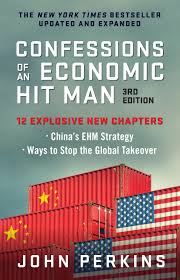Confessions of an Economic Hit Man
Background
- Economic Hit Man (EHM): Perkins describes his role as an EHM, tasked with convincing developing countries to accept large loans for infrastructure projects.
- Objective: The loans are designed to indebt these nations, ensuring they remain under the control of the lending countries and corporations.
Key Points
Role of an Economic Hit Man
- Primary Task: To create financial dependency by encouraging developing nations to take on massive loans.
- Methods: Use of economic forecasts, inflated project benefits, and manipulation of financial data.
- Outcome: Countries unable to repay loans are forced to concede to political and economic demands.
Case Studies
- Indonesia: Example of how loans were used to control the country’s resources.
- Ecuador: Detailed account of how oil resources were exploited, leading to environmental and social devastation.
- Panama: The story of Omar Torrijos and how his resistance to EHM tactics led to his assassination.
Corporate and Government Collusion
- Corporations: Major corporations benefit from the infrastructure projects funded by these loans.
- Governments: U.S. government and international financial institutions like the World Bank and IMF are complicit in these schemes.
- Military Intervention: When EHM tactics fail, more coercive measures, including CIA interventions and military actions, are employed.
Personal Journey
- Recruitment: Perkins was recruited by the National Security Agency (NSA) and later worked for a consulting firm.
- Moral Conflict: His internal struggle with the ethical implications of his work.
- Resignation: Eventually, Perkins left his job, disillusioned by the harm caused by his actions.
Global Impact
- Economic Inequality: The book highlights how these practices exacerbate global inequality.
- Environmental Degradation: Large-scale projects often lead to significant environmental damage.
- Political Instability: The manipulation of economies contributes to political instability and conflict.
Calls to Action
- Awareness: Perkins urges readers to become aware of these practices and their consequences.
- Advocacy: He advocates for more ethical economic practices and greater transparency in international finance.
- Personal Responsibility: Encourages individuals to take responsibility and act against such exploitative systems.
Conclusion
- Reflection: Perkins reflects on the broader implications of his work and the systemic nature of economic exploitation.
- Hope for Change: Despite the grim realities, he remains hopeful that awareness and activism can lead to positive change.
Final Thoughts
- Impact: The book serves as a powerful exposé of the hidden mechanisms of global economic control.
- Legacy: It has sparked discussions on economic justice, corporate responsibility, and the need for systemic reform.
read more book summaries at https://mastercssprep.com/category/write-up/book-reviews/

